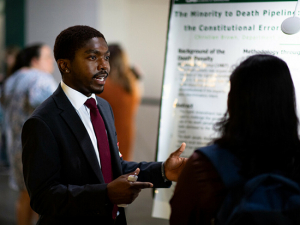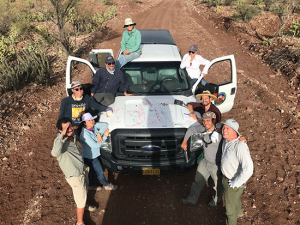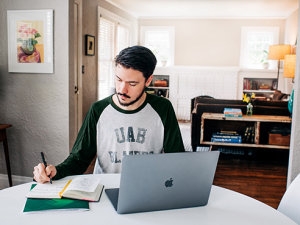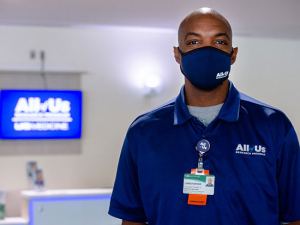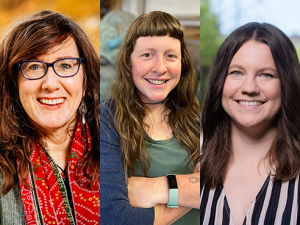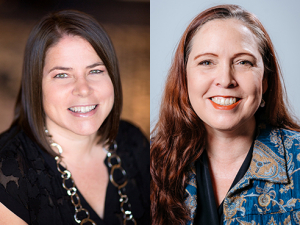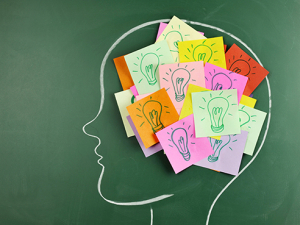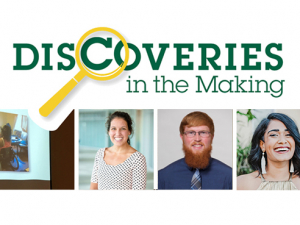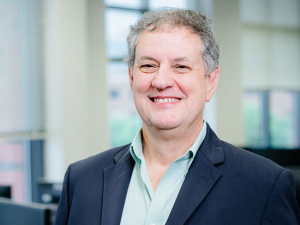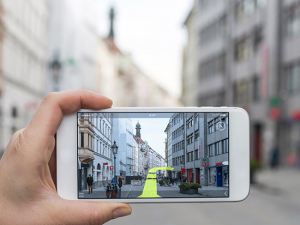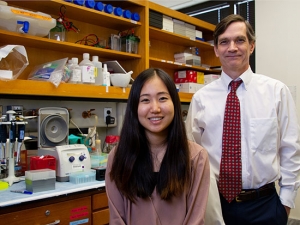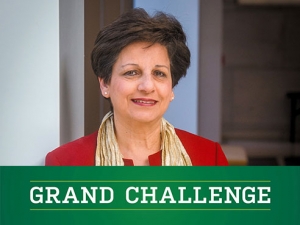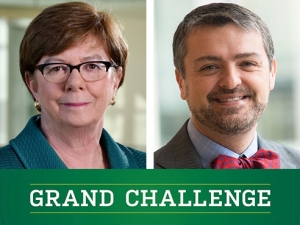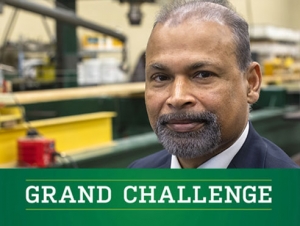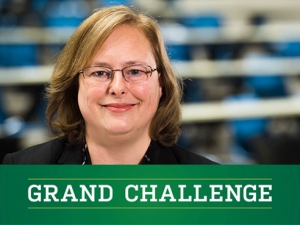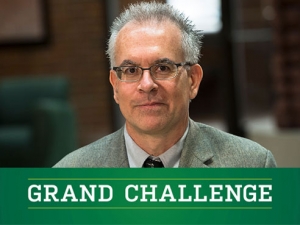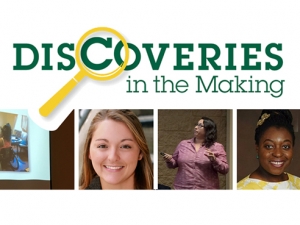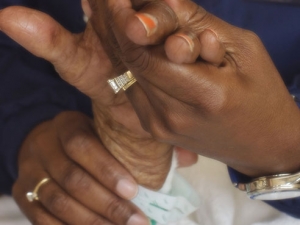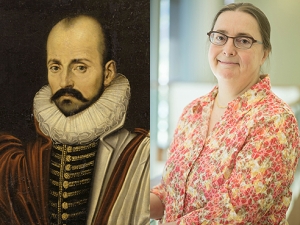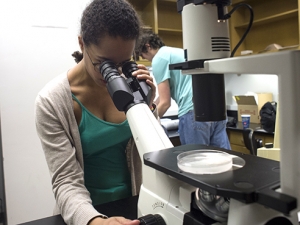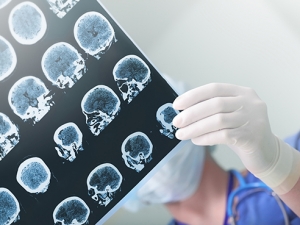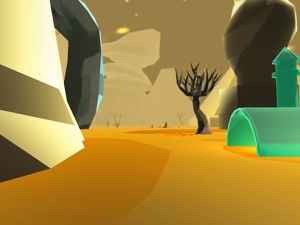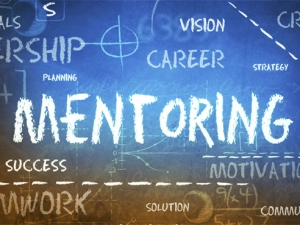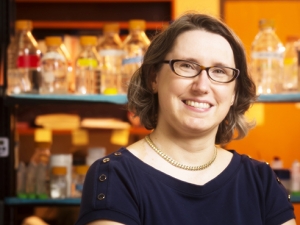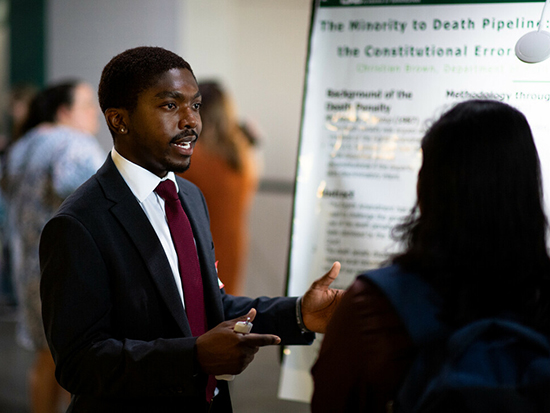 A student presenting at the Spring 2023 Expo. Photo by Ian Logue, UAB Marketing and CommunicationsUndergraduate research is such a part of the fabric of UAB that a symposium in the middle of July can attract a crowd.
A student presenting at the Spring 2023 Expo. Photo by Ian Logue, UAB Marketing and CommunicationsUndergraduate research is such a part of the fabric of UAB that a symposium in the middle of July can attract a crowd.
Nearly 300 students will be presenting their work at the Summer 2024 Expo this week. The event runs from July 22–26 online, with in-person oral presentations at Sterne Library from 8 a.m.-noon July 24 and poster presentations at the Alumni House on July 25 from 8 a.m.-3 p.m.
The expos, held every fall, spring and summer semester, showcase the variety of undergraduate research, creative activity and scholarship opportunities at UAB, explains Gareth Jones, Ph.D., director of the Office of Service Learning and Undergraduate Research. The events also give students the chance to practice explaining their work to lay audiences.
“Overall, for the 2023-2024 academic year we had 1,052 total submissions,” a 19 percent increase over the previous academic year, Jones noted.
The Reporter spoke with three students who will be delivering poster presentations Thursday to learn more about their projects, their research experience at UAB and their advice for other students interested in taking advantage of the unique opportunities available in UAB’s world-class research labs.
Omari Whitlow
Biomedical Sciences Major, UAB Honors College Personalized Pathway
Project: Exploration of Digital Health Literacy in the Deep South
Mentor: Whitlow, who came to UAB from the Tampa area, worked with mentor Gabrielle Rocque, M.D., a hematologist/oncologist and associate professor in the UAB Heersink School of Medicine whose research focuses on improving the quality of health care delivery for cancer patients.
The research: “As technological advances are implemented in health care, patients with cancer and low digital health literacy are at risk for inequitable clinical outcomes,” Whitlow writes in his abstract. “Understanding community comfort with technology is foundational for the application of digital health care tools.”
Whitlow analyzed a survey of 164 community members and health care workers in Alabama and Mississippi to gauge their comfort levels in scanning QR codes and completing other technology-related tasks.
“Community members within the Deep South self-reported lower digital health literacy than health care workers,” Whitlow concludes.
Zoey Swalley
Immunology Major, UAB Honors College Science and Technology Honors Program
Project: Evaluating the cumulative effects of an exogenous ketone ester diet and anti-PD-L1 in a murine model of triple negative breast cancer
Mentor: Swalley started working in the lab of Lyse Norian, Ph.D., an associate professor in the Department of Nutrition Sciences in the School of Health Professions, during the spring semester of her freshman year.
The research: “Ketosis is a biological process where the body metabolizes fat when carbohydrates are in limited supply,” Swalley writes in her abstract. “This process produces ketone bodies, which are an unfavorable source of energy to cancerous cells. Increasing the amount of ketone bodies may essentially starve cancerous cells of available energy sources and limit growth and metastasis.”
Branden Duyvestyn
Neuroscience Major, UAB Honors College Science and Technology Honors Program
Project: Late-stage autosomal dominant polycystic kidney disease mice have increased colon permeability
Mentors: Takamitsu Saigusa, M.D., associate professor in the Division of Nephrology, and Randee Sedaka, Ph.D., postdoctoral trainee
The research: Duyvestyn is part of the UAB KURE (Kidney, Urology and non-malignant Hematology Undergraduate Research Experience) program. His presentation covers his research this summer with Saigusa and Sedaka.
“Autosomal dominant polycystic kidney disease (ADPKD) is the most prevalent genetic kidney disease,” Duyvestyn explains in his abstract. “ADPKD is marked by bilateral kidney cyst growth that leads to tubular damage and ultimately renal failure. Most cases of ADPKD result from mutations in the PKD1 gene. Other chronic kidney diseases show an association between kidney disease severity and increased intestinal permeability.”
What you learn in UAB labs
1. Research opens doors:
“Research helps open doors that allow for greater experience,” Whitlow said. He has been working with Rocque since November 2023; hers is the third lab he has worked in while an undergraduate at UAB. That experience is invaluable in his goal of going to medical school and becoming a physician.
2. You can learn from peers and near-peers:
“Oftentimes, you’re working side by side with people of different academic levels (undergraduate students, graduate students, postdocs, etc.), so you can learn directly from your peers who have different experiences,” Swalley said.
3. Translate classroom learning to real life:
“Participating in a research lab allows you to take the information you learn in class and use it in a ‘real-life’ situation,” Swalley added. “I am an immunology major, and one of the central focuses of my lab is the immune system. A lot of the information we cover in class is further expanded upon in my lab, which is really helpful to my overall understanding.”
4. Find out how science works:
Working in a research lab is a great way “to better understand science by practicing research techniques,” Duyvestyn said, which in turn allows undergrads to “better understand research methodology in the future.” Working in multiple labs expands that scope. Duyvestyn started out in research in his freshman year working in the lab of Talene Yacoubian, M.D., Ph.D., John A. and Ruth R. Jurenko Endowed Professor in the Department of Neurology, as part of the UAB Presidential Honors Fellowship program, a summer research internship through the Honors College. He now works in the lab of Aurelio Galli, Ph.D., Distinguished Professor and Champ Lyons Endowed Chair in General Surgery in the Department of Surgery, where he will start his thesis work in fall 2024.
5. Discover how to break down difficult topics:
“Another skill that can be developed through research is academic literacy,” Swalley said. “If you want to work in academia as your future career, being able to interpret academic text is an important skill to have. Previously published literature is the foundation of what is being currently researched, so reading is prevalent while working in a lab. My lab has a weekly meeting called ‘Journal Club’ where somebody from my lab chooses an article that is important to their project and presents the article to the rest of us. It is a very engaging way to break down difficult topics while in a group setting.”
6. Gain professional skills:
Research also is “an efficient way to learn professional skills like public speaking, presenting and time management,” Duyvestyn said.
The Expo is one great way to put those skills into practice. And one way any Blazer can contribute is to come out and listen to students present their work and ask questions. See dates, locations and schedules here.
Learn more about undergraduate research opportunities at UAB.
Discover more about biomedical sciences, neuroscience, immunology and all the other majors available at UAB on the Find your Degree site.
